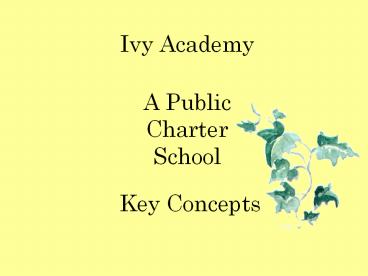Ivy Academy - PowerPoint PPT Presentation
Title:
Ivy Academy
Description:
Sources that go beyond textbooks. Relationships among concepts ... the lessons of the senses, and used his direct experience with nature to solve a problem. ... – PowerPoint PPT presentation
Number of Views:32
Avg rating:3.0/5.0
Title: Ivy Academy
1
Ivy Academy
A Public Charter School
Key Concepts
2
!!! Public School !!!
- Aligned with HCDE Strategic Plan
- Aligned with purpose of charter school law
- Serving at risk and other students
3
Learning Environment
- Small Class Groups
- Themed learning
- Project-based learning
- Outdoor classrooms
- Longer class periods
4
Integrated Thematic Learning
- A combination of subjects
- An emphasis on projects
- Sources that go beyond textbooks
- Relationships among concepts
- Thematic units as organizing principles
- Flexible schedules
- Flexible student groupings
5
Integrated Learning
- takes place for the students within each
discipline and expanding into the integration of
all subjects.
6
Benefits of Integrated Learning
- Mirrors the real world
- Motivates students learning is relevant to
their personal lives - Works with the natural ways in which the brain
integrates and processes new information
7
Benefits continued
- Adds coherence to vast amounts of information by
making connections among disciplines - Acknowledges reading, writing, speaking,
listening, viewing, and the use of numbers as
enabling skills within thinking processes. - Fosters collaboration among students and
teachers.
8
Projects
- Year-level teacher teams will design
interdisciplinary projects which can be
personalized for each student - Students work to design a solution for the
problem by using critical thinking skills and
applying the knowledge learned in each of the
disciplines.
9
Purpose of Projects
- Teachers can have a common aim for the knowledge
conveyed in their individual classes - Depth of subject matter is supported and
increased - Demands critical thinking from the students and
the teachers in order to design a solution - Student-learned knowledge is applied to a real
world application. - Graduation standards are fulfilled.
10
Integrated Thematic Learning
Freshman Our Natural World Sophomore Anthropology Junior Sociology Senior Study of the Self
Science Biology/Botany local flora/fauna (basic Geology) Environmental 1 Chemistry Environmental 2 Physics Anatomy and Physiology
Social Studies History Geography US History World History (pre-20th century) Current US History/World History (20th 21st century) 1 Economics 2 American Gov.
Math Algebra 1 Geometry Algebra 1 Geometry Algebra 2 Statistics Algebra 2/Trig. Calculus
Literature/English ------------------------ Etymology Man v Nature ----------------------- Etymology Man v Self, Man v Man-Ancient Lit. Etymology Man v Society ----------------------- Etymology Man v Self ----------------------- Etymology
Foreign Language First year lang. Second year lang. Third year lang. Fourth year lang.
Fine Arts Visual Art Art History Folk Art 1 Health 2 Psychology
Life Skills Suggested Caring for living things Building, planning Sewing, woodworking Bookkeeping
11
Why Outdoors?
- Return students to a healthy, natural learning
environment - Gardners 8th Intelligence Naturalist
- The ability to recognize and classify
- In a natural Setting rocks, plants, animals
- In an urban Setting automobile, clothing,
electronic brands
http//www.education-world.com/a_curr/curr054.shtm
l
12
Todays Students
- Nature-deficit disorder describes the human
costs of alienation from nature, among them
diminished use of the senses, attention
difficulties, and higher rates of physical and
emotional illnesses. - The rate at which doctors prescribe
antidepressants to children has doubled in the
last five years. - By the 1990s the radius around the home where
children were allowed roam on their own had
shrunk to a ninth of what it had been in 1970. - Today, average eight-year-olds able to identify
more cartoon characters than native species, such
as beetles and oak trees, in their own community. - Benjamin Franklin applied a scientists mind
to the lessons of the senses, and used his direct
experience with nature to solve a problem. - (Last Child in the Woods)
- Physical education / wellness is in inseparable
component and is daily.































